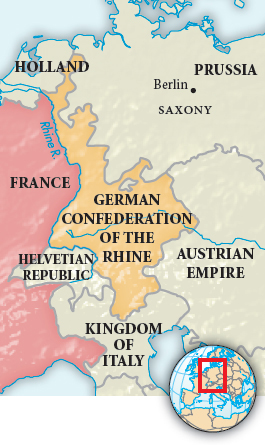Napoleon’s Expansion in Europe
After coming to power in 1799, Napoleon sent peace feelers to Austria and Britain, the dominant powers of the Second Coalition. When these overtures were rejected, French armies led by Napoleon decisively defeated the Austrians. Subsequent treaties with Austria in 1801 and Britain in 1802 consolidated France’s hold on the territories its armies had won up to that point.

In 1802 Napoleon was secure but still driven to expand his power. Aggressively redrawing the map of German-
Austria, Russia, and Sweden joined with Britain to form the Third Coalition against France shortly before the Battle of Trafalgar. Yet the Austrians and the Russians were no match for Napoleon, who scored a brilliant victory over them at the Battle of Austerlitz in December 1805. Russia decided to pull back, and Austria accepted large territorial losses in return for peace as the Third Coalition collapsed.
Napoleon then reorganized the German states to his liking. In 1806 he abolished many tiny German states as well as the Holy Roman Empire and established by decree the German Confederation of the Rhine, a union of fifteen German states minus Austria, Prussia, and Saxony.
Napoleon’s intervention in German affairs alarmed the Prussians, who mobilized their armies. In October 1806 Napoleon attacked them and won two more victories at Jena and Auerstädt. The war with Prussia, now joined by Russia, continued into the following spring. After Napoleon won another victory, Alexander I of Russia was ready to negotiate for peace. In the treaties of Tilsit in 1807, Prussia lost half its population through land concessions, while Russia accepted Napoleon’s reorganization of western and central Europe and promised to enforce Napoleon’s economic blockade against British goods.